GWS star Chloe Dalton on the part-time reality v full-time expectation of AFLW and why it has to change
The expectation on women forced to juggle work and footy is out of sync with the part-time reality of AFLW. It’s time for change, GWS Olympic gold medallist Chloe Dalton writes
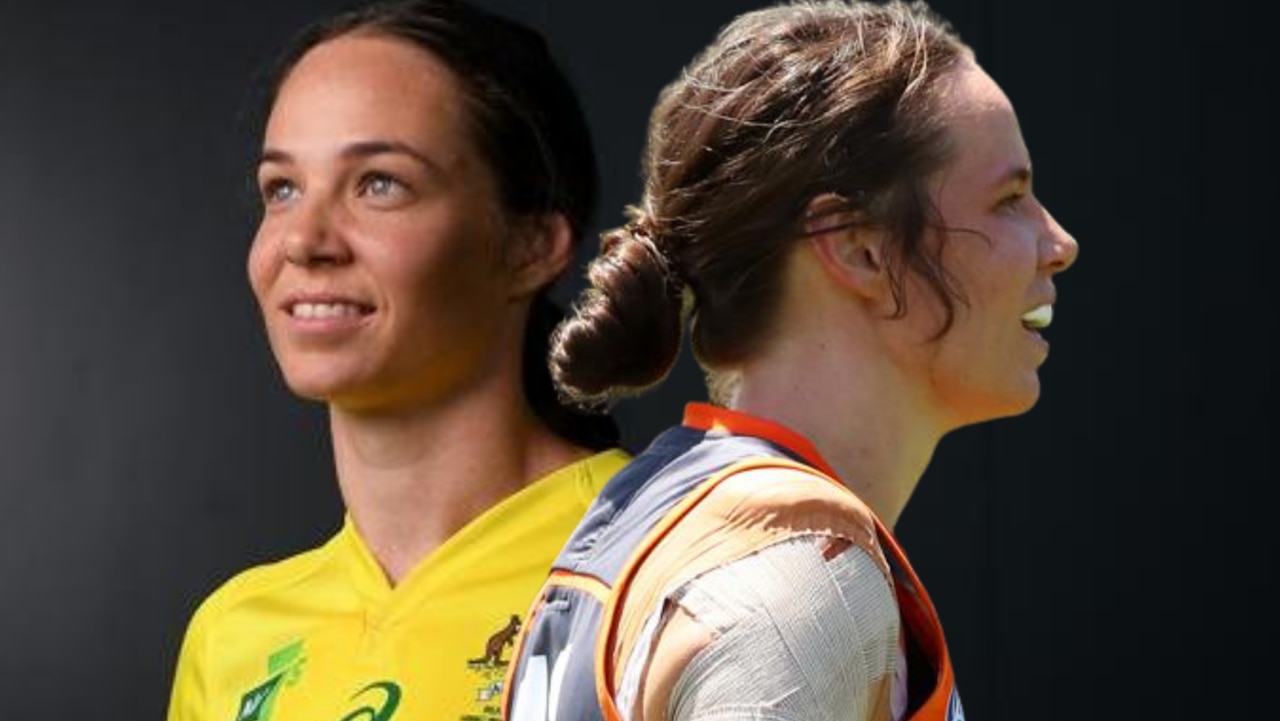
Sometimes it feels like I’ve taken a step backwards in my sporting career.
I won a gold medal with my Rugby 7s teammates at the 2016 Rio Olympics having prepared in a full-time environment.
It was a dream realised from when I was a seven year old kid wanting to win gold after watching Cathy Freeman’s historic moment at the Sydney 2000 Olympics.
Stream every match of the 2022 NAB AFLW Season Live & On-Demand on Kayo. New to Kayo? Try 14-days free now >
It was also a dream that became a reality because of the vision, investment and understanding of an organisation on the importance of allowing athletes to be completely devoted to their craft.

Because we are semi-professional athletes my teammates are also teachers, carpenters, exercise physiologists and university students.
This requires a great deal of flexibility from employers – players have to finish early to travel to the club and begin their physical preparation before team meetings and training starts.
We often don’t get home until 10pm at night.
Recent Covid-19 outbreaks have meant that games have been cancelled and rescheduled at the last minute — sometimes these game are played midweek, sometimes they require interstate travel at short notice.
As a result, our footballers are required to take days off work in the hope their boss will accommodate another request for unpaid leave.
This week we have had to have our Saturday match against St Kilda postponed because of Covid, further complicating the fixture.
It is important to recognise the investment from the AFL to foster a competition that continues to grow and expand — more games, more teams.
This season, many people have commented about the “year on year improvements”.
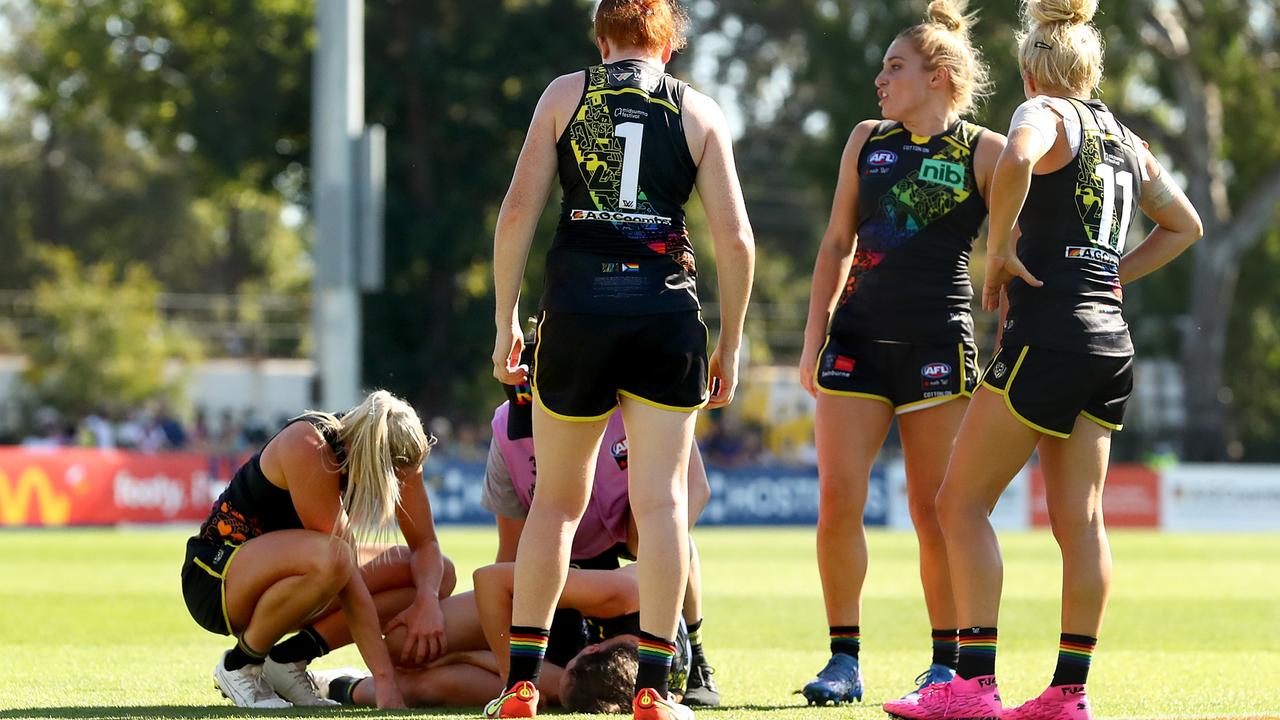
But a huge component of this success has been the result of players and staff investing hundreds of hours outside of their part-time, six-months-of-the-year contracts.
Heartbreakingly, six AFLW players have ruptured their anterior cruciate ligaments (ACL) in the first four rounds of the 2022 competition.
There isn’t specific data to demonstrate that the part-time nature of AFLW is a factor in the prevalence of these season-ending injuries.
But a year-round, full-time program provides athletes with consistency. A consistency in preparation, training loads, recovery protocols, physical preparation and nutritional patterns.
We know that these are significant factors in reducing the risk of injury in elite sport.
Resources such as medical teams and strength and conditioning coaches also become more accessible in full-time programs.
There is no doubt that investment in a full-time program would also improve the quality of the overall product.
Players can complete additional sessions to work on specific skill sets or position-specific skills, rather than missing the 15-minute optional skills block because they can’t arrive in time after work.
Being employed full-time affords you the ability to be a complete athlete, not an athlete who fits the “most important” elements of training into their rushed part-time window.
I know this from experience.
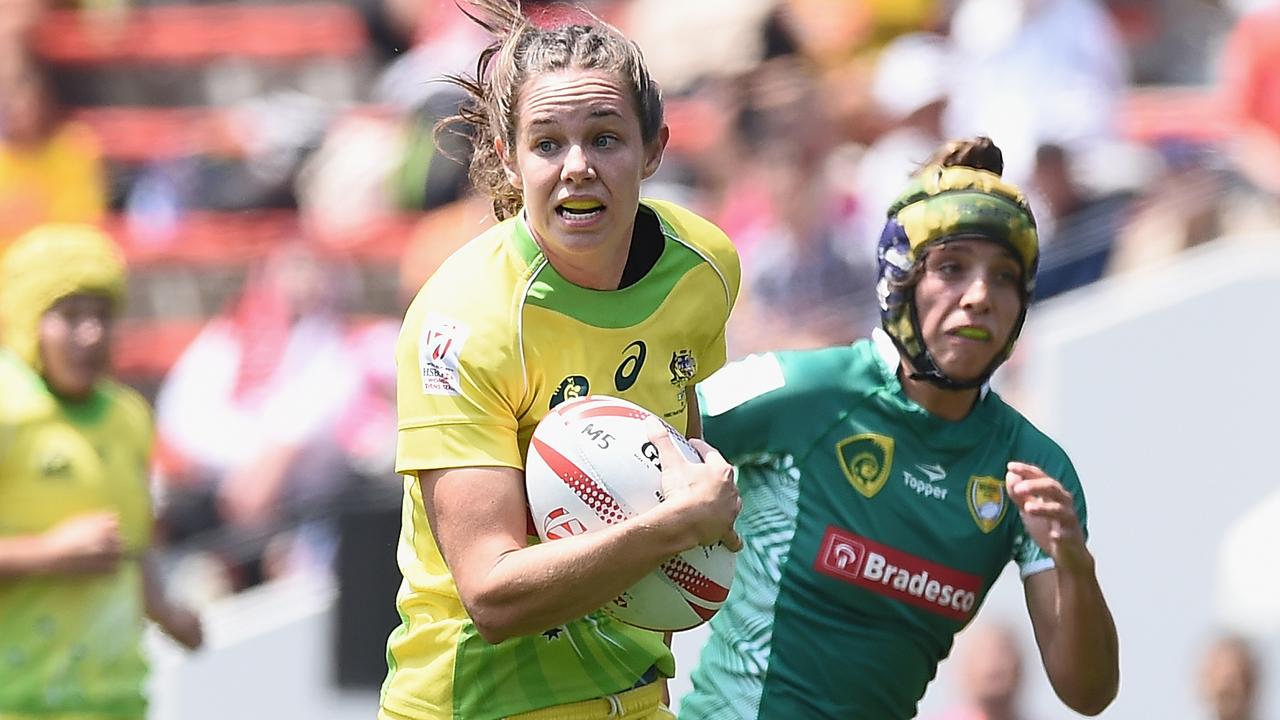
When I was invited to train full-time with the Australian Rugby Sevens in 2014 we were full-time athletes. The coaches, physiotherapists and strength and conditioning coaches were also employed full time.
Entire days were devoted to physical preparation, video analysis, opposition breakdown, player-specific skills sessions, team training sessions, gym sessions, extra conditioning sessions.
I would come home after a full day of training, make a huge sandwich and a bulk protein shake, imprint myself on the couch and sleep for a couple of hours, before waking up, eating dinner, and then going to bed before doing it all again the next day.
It wasn’t always this way. The Australian Rugby Sevens continually finished between third and sixth at international level by being part-time and preparing with regular weekend camps.
In January 2014 they decided the camps would not cut it and the program would go full-time. We won gold in 2016 and the seven-year-old kid in me got to stand on the podium, with her teammates by her side, and have her own Olympic Gold Medal around her neck. Just like Cathy.
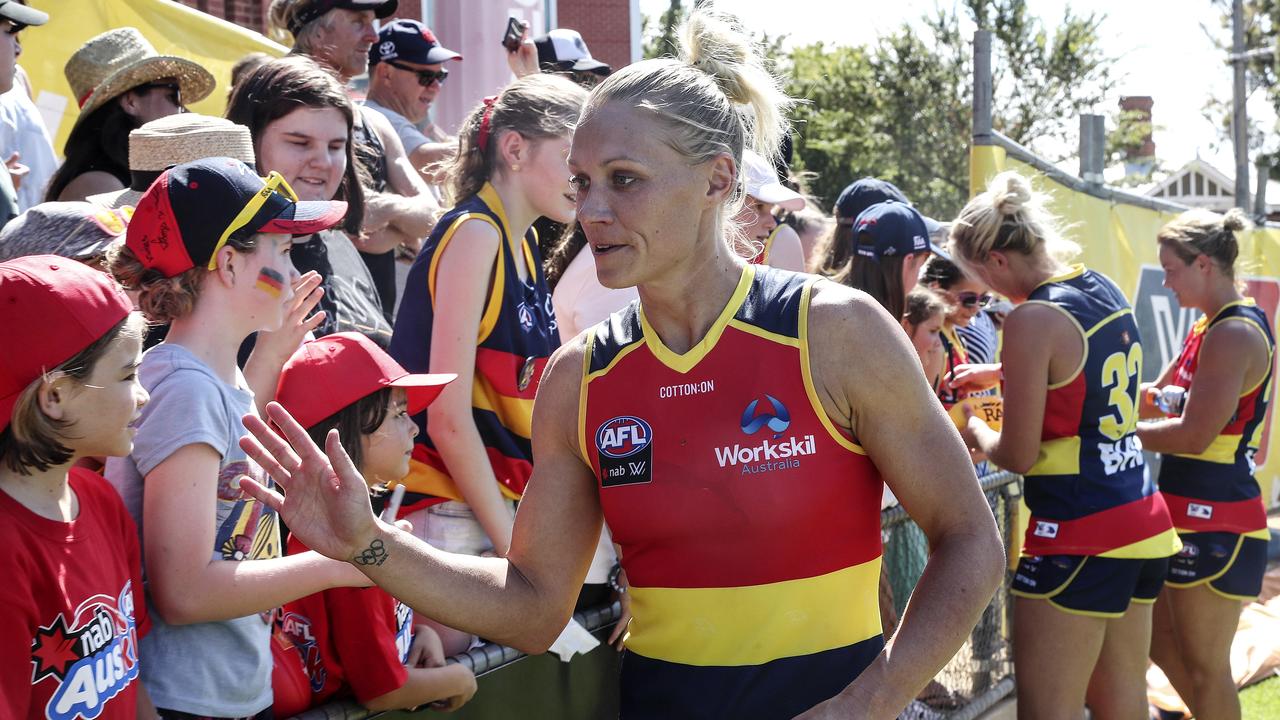
We have already seen the impact of AFLW on the growth of women’s football at grassroots level.
In 2017 – the inaugural season of the AFLW – females made up 30 per cent of the 1.5 million people that were participating Australian rules nationwide.
In 2021, the percentage of females playing the code at a grassroots level surpassed 40 per cent, just five years later.
A higher-quality product results in a continued increase in investment from sponsorship and broadcast deals, and more eyes on the game.
More young people watching the game, and as a result playing the game, creates a more sustainable future for footy.
To achieve growth at a faster rate with realistic expectations on the athletes involved, the AFLW needs to be a full-time job for players and staff alike.
It requires vision, investment and understanding to achieve success.
The investment works. I’ve got a gold medal to prove it.
*Chloe Dalton is a Giants player and works part-time for Giants media.
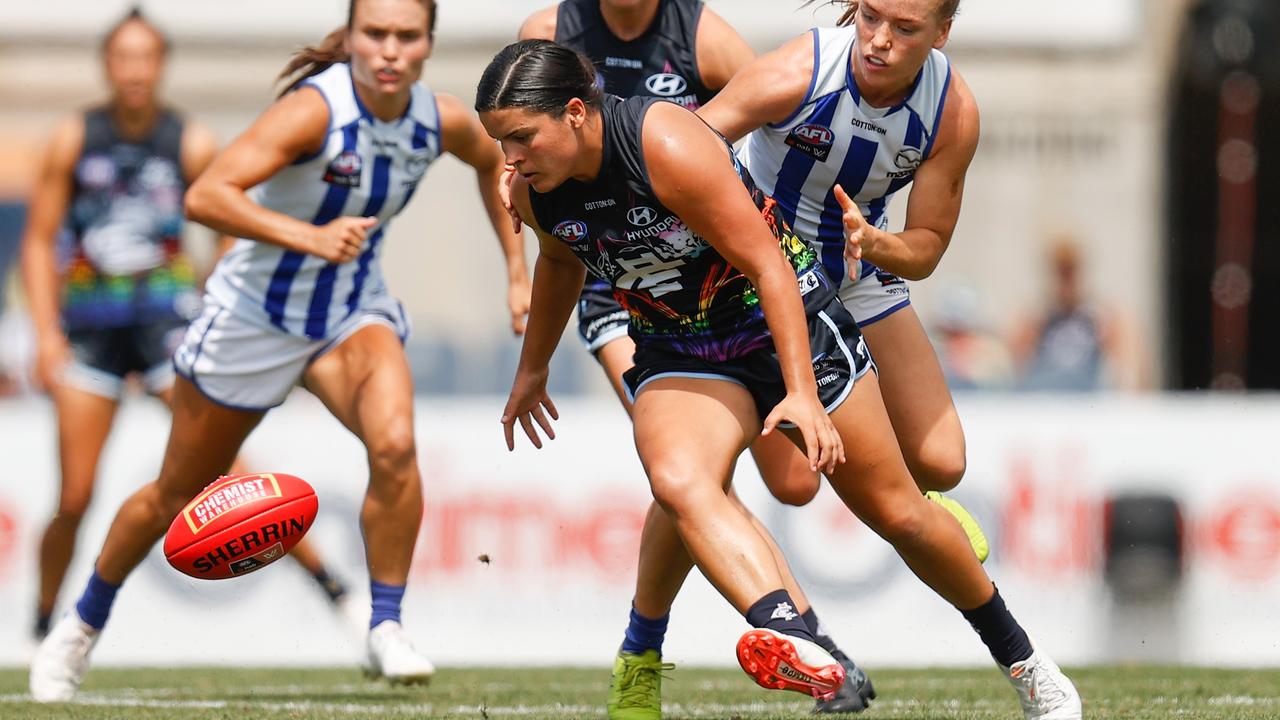
Prespakis: Covid damaging integrity of AFLW season
—Lauren Wood
AFL Women’s best and fairest winner Maddy Prespakis says she would rather play in hubs than endure a fixture continually ravaged by Covid-19.
Prespakis, 21, said she feared that the competition could become compromised in the run to finals as the AFL continued to change games on the run.
The league has had to move, reschedule and postpone five games this weekend as clubs continue to grapple with the Omicron virus.
The Giants are the latest club unable to field a side this weekend.
Western Bulldogs, West Coast, Brisbane, Gold Coast and St Kilda have all had games cancelled and face having to jam in midweek matches to complete a compromised season.
St Kilda have had successive matches postponed and will not play a game of football for 18 days.
Prespakis, 21, said she would prefer a hub-style arrangement over continual fixture changes.
“I’d much prefer being in a hub, I’d say,” Prespakis told the Herald Sun ahead of this weekend’s Carlton Respects game.
“It’s such a short season that you could probably do the hub and get it done even quicker with all 10 games. Do two in a week or something for everyone, rather than chopping and changing.
“We’re halfway now, but who knows how long it is going to take with fixture changes. I don’t know when we’re going to be going to WA.”
Carlton has had several games either refixtured or cancelled due to its opponents being affected by Covid, while other teams have remained largely unscathed, prompting some envy with hot conditions also a factor in backing up for games.
“Some people look at other teams’ fixtures and think ‘they’re lucky, they’re playing these clubs’ and things like that. But then you do look at the integrity of it – the teams that are getting their games played and then not really getting fixture changes, you kind of envy them in a way,” she said.
“They get six-day breaks rather than three, or whatever it is. I haven’t looked that much into it, but at the back of the season if we have to do another two games in a week, we’d be like ‘far out, we’re tired’.
“You don’t want to use it as an excuse … but playing two games in a week when others have a week’s rest, it’s pretty tough.”
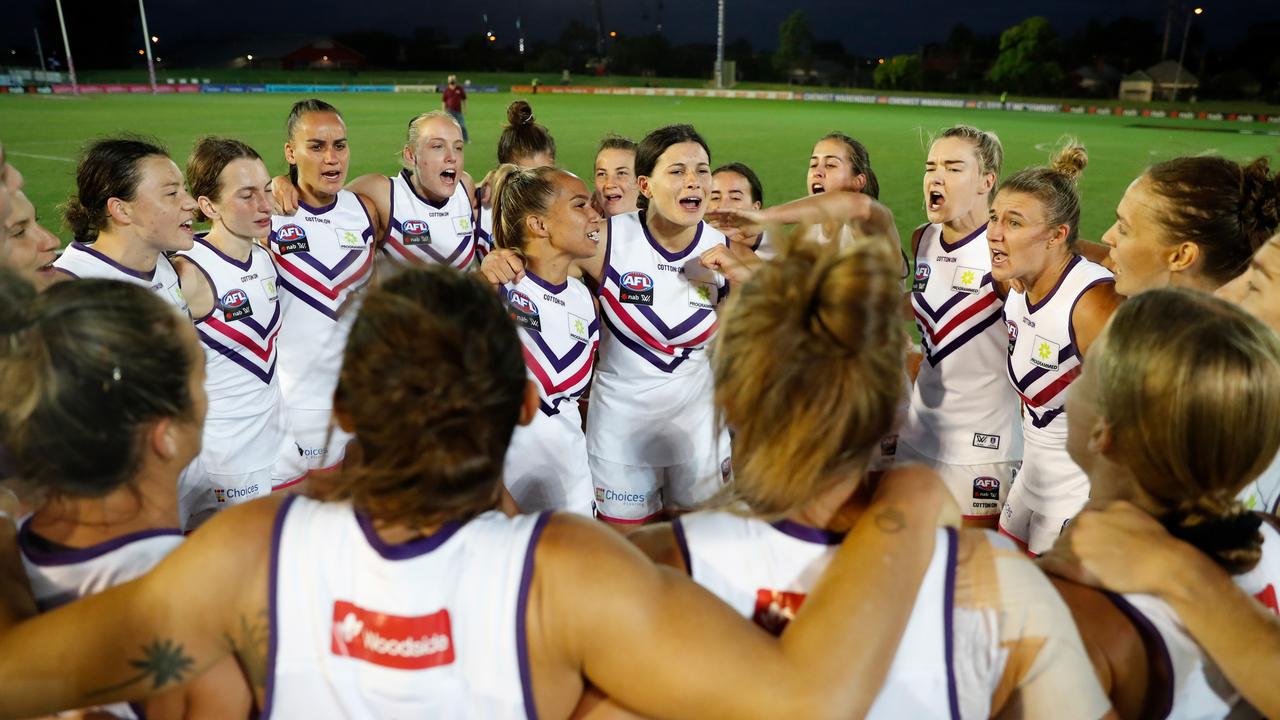
The AFL continues to work with the Western Australian government and hopes West Coast and Fremantle could return west in coming weeks.
A number of players are continuing to work from their hotel base, with all travelling players paid at least $200 per day on top of their wage, plus a meal allowance, for being away from home.
It is understood that the Dockers had initially resisted making the trip to Tasmania for their meeting with North Melbourne in Hobart on Sunday, after spending a month — and now potentially longer amid ongoing border dramas — on the road.
The Blues’ clash with Adelaide on Sunday – which marks the Carlton Respects game, promoting gender equality for the prevention of violence against women – was one of only two games in this weekend’s fixture that were unaffected by Covid reshuffling.
As players – including a number of teachers – return to full-time work after the summer break, Prespakis said the toll was becoming evident.
“Potentially towards the back-end of the season you might see girls have to take more annual leave to get their games in. It’s going to take a toll, because getting up to go to work after training is just as tiring anyway,” she said.
“If you’re playing two or three games in a week to try and catch up, it’s definitely going to take a toll on players and the back-end of the season is the crunch time.”
Pride-less: Eagles admit having no pride jumper was ‘wrong’
West Coast chairman Russell Gibbs has conceded the Eagles got it wrong by not having a pride guernsey ready for the AFLW Pride celebration last weekend.
The Eagles endured a messy and embarrassing saga that attracted national attention after it was revealed they were the only AFLW club not to have organised a special LGBTQIA-themed guernsey.
“Not having a jumper ready for the AFLW Pride round is something that we got wrong,” Mr Gibbs told The Sunday Times.
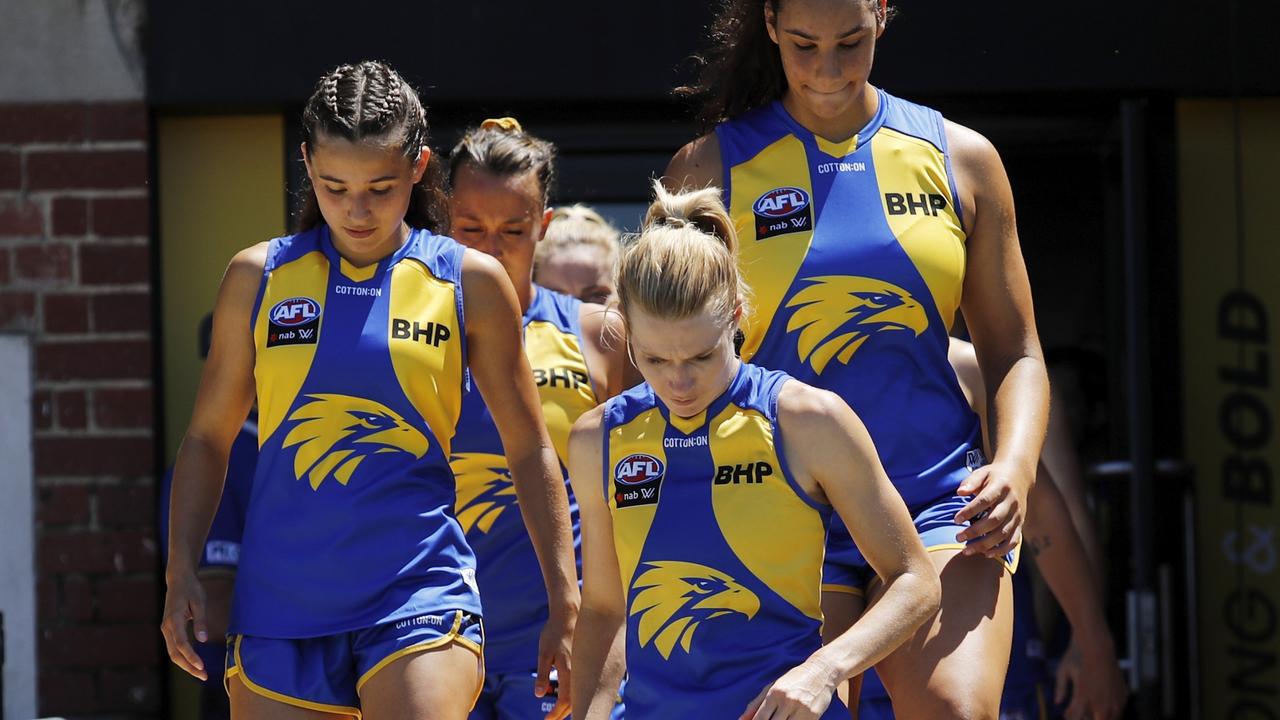
“The club had been working on concepts and getting input, but it needed to be better prepared and certainly next year we will have a jumper and look forward to unveiling it at that time.”
His comments follow the controversial decision by Greater Western Sydney player Haneen Zreika to sit out Round 4 because her Muslim religion would not allow her to wear the club’s Pride jumper.
Zreika, the AFLW’s first Muslim player, explained on Instagram she had a “responsibility to represent my faith and my community”.
“I respect people regardless of their sexual orientation,” she wrote.
Giants coach Alan McConnell defended Zreika’s decision by saying “we empathise with the challenges she faces in this circumstance”.
“But equally we’re really proud of the connection and obligations we have to the LGBTQI community,” McConnell said after the Giants beat Western Bulldogs on Friday night.
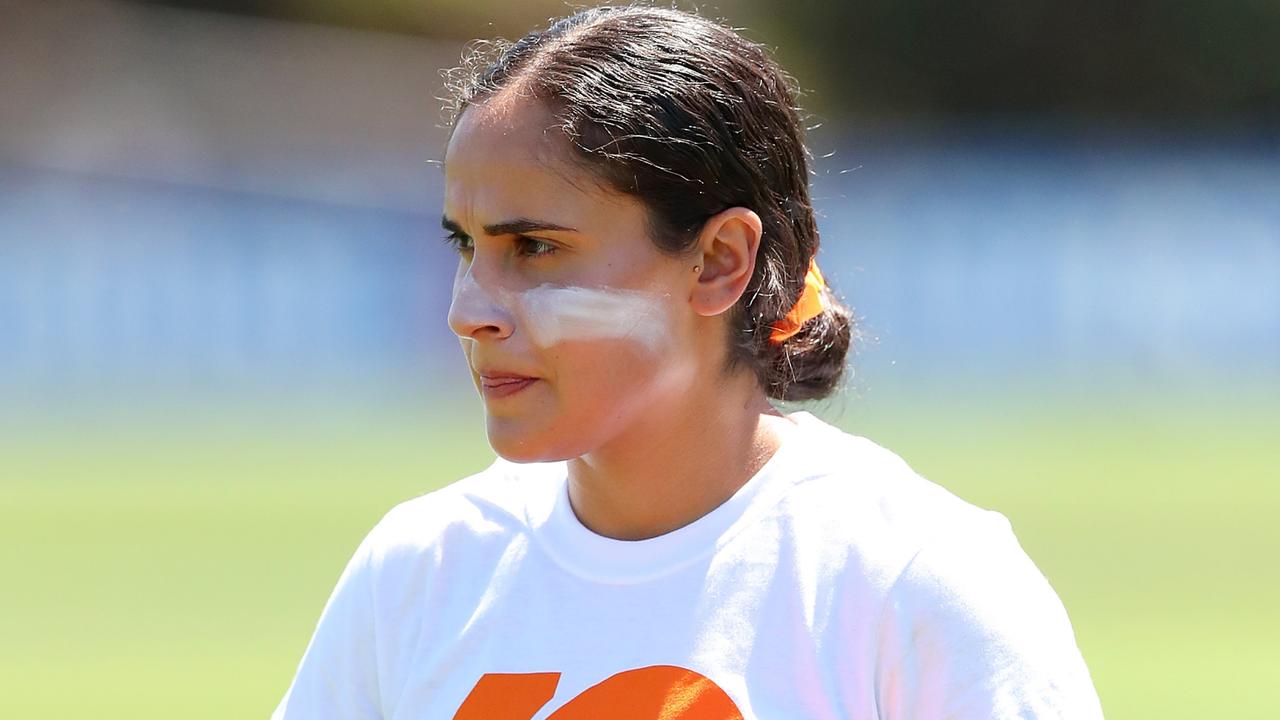
West Coast coach Michael Prior came under fire when he refused to answer questions about the Eagles being the only one of 14 AFLW clubs not to have a special pride jumper.
“I talk about footy, not what we’re wearing. I think we’ve done the pride stuff to death, to be honest,” Prior said.
He later apologised to anyone “who was offended by the report”.
Gibbs said it was not fair to ask the Eagles’ women’s team, who have had two games postponed because they can’t field a team due to Covid, to remain on the east coast for the rest of the AFLW season.
“We’ll do what we can to ensure the competition continues to run, but we are mindful that players have those personal and professional commitments back in Perth,” he said.
“I think, for personal and work reasons, at some in point in time they’ll have to come back. They can’t be indefinitely away.”




